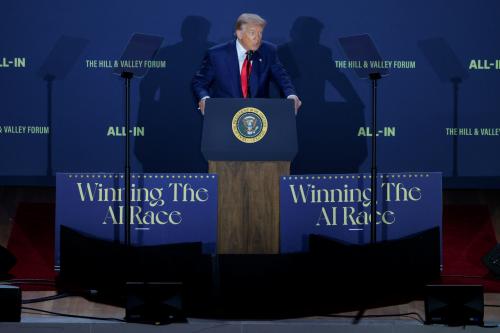In an interview with Forbes/Wolfe Emerging Tech Blog, Peter Singer discusses broader trends in military technology across the globe, and whether the United States can maintain its competitive advantage on this playing field.
Forbes: What catalyzed your interest in the technology of warfare?
Peter Singer: The spark that really started me out happened in a Sharper Image store, where I saw a robotic system for sale. Soon I was talking with friends in the Air Force who were operating unmanned aerial systems–robotic planes–and I was struck by the disconnect between their reality and the talking points of military experts. At a major defense conference, where many key civilian and military leaders were analyzing current revolutionary trends, I never once heard the words “robot” or “unmanned” spoken. My friends in the military were carrying out battlefield action thousands of miles away and using robots to diffuse bombs, yet no one was talking about this incredibly momentous change that was starting to play out! So, from 2005 to 2008, I traveled the world interviewing anyone and everyone connected to the realm of war and robotics to research my latest book.
Forbes: What types of questions did you set out to answer in your research?
Singer: I asked what it’s like for the young pilots flying planes 7,000 miles away over Afghanistan. And what’s it like to be their squadron commander or their general? I asked about working for a company that designs robotic weapon systems, and what civilian politicians think about it all. I talked to science fiction authors who, it turns out, are also quietly consulting with the Pentagon. On the opposite side, what do insurgents in places like Iraq think about our robots being sent out to fight them? How are news journalists covering it around the world? What do human rights activists and humanitarian organizations think about it?
Forbes: Let’s step back for a moment and look at the broader trends in the evolution of technology and warfare. What have you observed?
Singer: Technology clearly does evolve, from the story of fire to the story of the Internet. Every so often in history, technological revolutions come along and change the rules of the game–they disrupt the norm. In business terms, we describe these as killer applications. But “killer app” takes on a whole new meaning when we’re referring to an armed robotic system. Technological advances in war have ranged from weapons like the longbow to inventions like gunpowder. Consider the world before and after gunpowder: when suddenly a peasant could carry a small weapon and be more effective than a knight who had spent his entire life training to fight. The steam engine ended the age of sails and eventually the internal combustion engine mechanized war with tanks and airplanes. Then came the atomic bomb, the computer…I believe robotics stands to have that same game-changing effect.
The Brookings Institution is committed to quality, independence, and impact.
We are supported by a diverse array of funders. In line with our values and policies, each Brookings publication represents the sole views of its author(s).



Commentary
Waging War With Robots
June 16, 2011